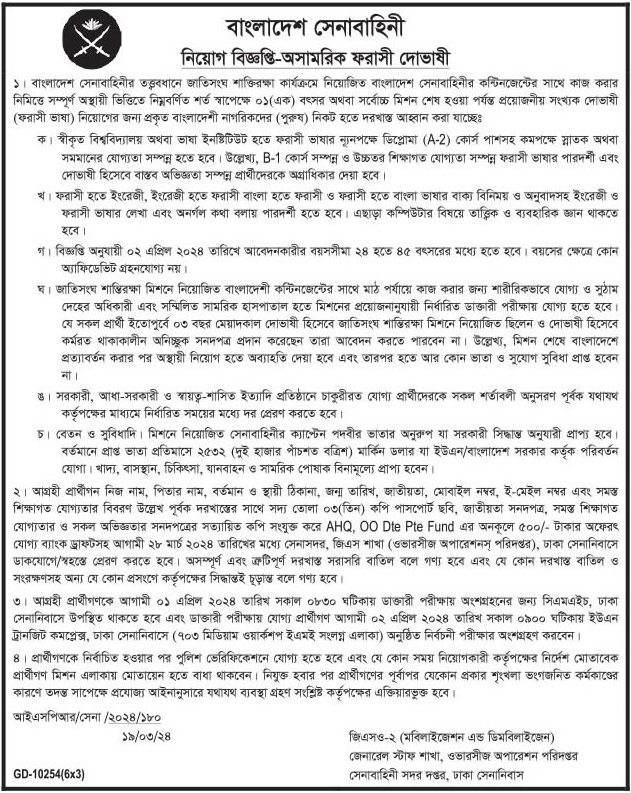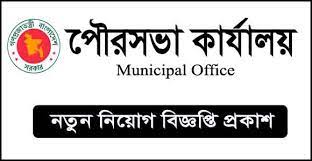Bangladesh Army
বাংলাদেশ সেনাবাহিনী
Job Category: Teaching/Academics
Job Source: The Daily Observer
Posted On: 20 Mar 2024
Application Deadline:28 Mar 2024

Welcome to our website bangladeshtodays.org. This is the best website online. Here you will get daily updates on all types of job news such as: E.g Job Vacancies in Public Sector, Private Sector, Corporate, Banking, NGO Jobs etc. You can select any type of job from the category option in the top menu of the website. You can apply for jobs directly on our website. There is a search option at the top of this website where you can search for jobs according to your requirements. If you have benefited even in the slightest from our website, then you can tell your friends, family and everyone else about this website. I hope you also benefit from this website. You can share this website post on Facebook, Instagram, Twitter or any other online platform if you want. Many people can benefit from your sharing. And if there is anything you want to know or understand, you can contact us by email on the contact page of this website. We will try our best to help you, thank you very much.
The Bangladesh Army is the land arm of the Bangladesh Armed Forces and is tasked with protecting the sovereignty and territorial integrity of Bangladesh. The Bangladesh Army was established in 1971 during the Bangladesh Liberation War and has since developed into a professional and capable force, important in maintaining national security, supporting civilian authorities, and contributing to peacekeeping operations around the world. plays a role. **History and origins:** The roots of the Bangladesh Army go back to the British Indian Army, which recruited soldiers from the Bengal region during the colonial period. After the Partition of British India in 1947, the Bengal Regiment of the British Indian Army was divided between India and Pakistan. During the 1971 Bangladesh Liberation War, Bengali soldiers and officers of the Pakistani army stationed in East Pakistan defected and joined the Mukti Bahini (freedom fighters), who played a key role in the struggle for independence from Pakistan. After the liberation of Bangladesh on December 16, 1971, the new government led by Sheikh Mujibur Rahman began the process of creating a national army to ensure the defense and security of the newly independent country. On April 4, 1971, the Bangladesh Provisional Government formally established the Bangladesh Army with General M.A.G. Osmani as its first commander. **Mission and Goals:** The mission of the Bangladesh Army is to protect Bangladesh’s sovereignty, territorial integrity, and national interests, protect its people, and uphold the country’s constitution and democratic principles. The main objectives of the Army are: 1. **Defense:** The Bangladesh Army is responsible for defending the country against external threats, invasions and territorial violations and ensuring the security of its borders and people. 2. **Internal Security:** The Army supports civilian authorities in maintaining law and order, combating terrorism, insurgency, and extremism, and providing humanitarian assistance and disaster relief in natural disasters and emergencies. 3. **Peacekeeping Operations:** The Bangladesh Army actively participates in UN peacekeeping operations around the world, lending its troops, expertise and expertise to promote peace, stability and conflict resolution in conflict-affected areas. , provides resources. 4. **Capability Building:** The Army is focused on improving readiness, combat capabilities, and technical capabilities through training, modernization, and investments in defense infrastructure and equipment. **Organizational structure:** The Bangladesh Army is organized into several corps, corps, divisions, and units, each with specific roles and responsibilities. The organizational structure of the Bangladesh Army includes: 1. **Army Headquarters:** Army Headquarters in Dhaka serves as the central administrative and operational center of the Bangladesh Army and oversees policy formulation, planning, coordination and resource management. 2. **Headquarters:** The Bangladesh Army is divided into several regional forces, including the Eastern, Western, and Central Commands, each responsible for preparing, training, and deploying troops in their respective areas of responsibility. I am. 3. **Corps:** The Army is organized into various corps, such as Infantry, Armored, Artillery, Engineer, Intelligence, and Medical Corps, each specialized in a particular combat or support function. . 4. **Divisions:** Army operational forces are organized into divisions, which are responsible for conducting tactical operations, including offensive maneuvers, defensive operations, and regional security. 5. **Brigades and Battalions:** Divisions are further divided into brigades and battalions, which consist of infantry, armor, artillery, engineers, and support units, whose mission is to carry out mission-specific tasks and operations. 6. **Special Forces:** The Bangladesh Army includes elite special forces such as Airborne Commando Brigades, Special Warfare Diving and Rescue Forces, and Special Security Forces, which are specialized in reconnaissance, sabotage, counterterrorism, and special operations. They are trained to perform the mission. . **Training and professional development:** The Bangladesh Army focuses on education, training and professional development to prepare its personnel for the challenges of modern warfare and peacekeeping operations. The Army operates several training facilities and academies, including: 1. **Bangladesh Military Academy (BMA):** BMA, located in Chittagong, is the premier officer training institution of the Bangladesh Army and is responsible for the initial training and education of cadets aspiring to become officers in the army. 2. **Bangladesh Military Academy (BMA):** BMA, located in Chittagong, is the premier officer training institution of the Bangladesh Army and is responsible for the initial training and education of cadets aspiring to become officers in the army. 3. **School of Infantry Tactics (SI&T):** SI&T provides advanced training in infantry tactics, small unit operations, and combat leadership to officers and soldiers of the Bangladesh Army. Four. **Army Medical College (AFMC):** AFMC provides medical education and training to military physicians, nurses, and allied health professionals and specializes in combat casualty care, trauma management, and public health. 5. **Bangladesh Military Academy (BMA):** BMA, located in Chittagong, is the premier officer training institution of the Bangladesh Army and is responsible for the initial training and education of cadets aspiring to become officers in the army. 6. **Bangladesh Institute for Peace Support Operations Training (BIPSOT):** BIPSOT provides specialized training for military personnel to participate in UN peacekeeping missions, with a focus on peacekeeping operations, conflict resolution, and humanitarian assistance. It offers. **Equipment and modernization:** The Bangladesh Army is continuously modernizing its equipment, weapons, and infrastructure to improve its combat capabilities and operational efficiency. The Army’s inventory includes a wide variety of armored vehicles, artillery systems, small arms, aircraft, and support equipment purchased from a variety of domestic and international suppliers. Recent acquisition and modernization efforts include the procurement of new tanks, infantry fighting vehicles, artillery, helicopters, unmanned aerial vehicles (UAVs), and communications systems to enhance defense capabilities and readiness. **Peace Mission:** The Bangladesh Army has a long history of participating in United Nations peacekeeping operations, contributing troops, expertise and resources to support global peace and security efforts. Bangladesh is one of the largest contributors of troops to UN peacekeeping operations. Thousands of soldiers are stationed in conflict zones around the world. Bangladeshi peacekeepers serve in various UN missions, including in countries such as Congo, Lebanon, South Sudan, Haiti, and Liberia, in restoring stability, protecting civilians, and promoting peacebuilding and peacekeeping efforts. played an important role.

